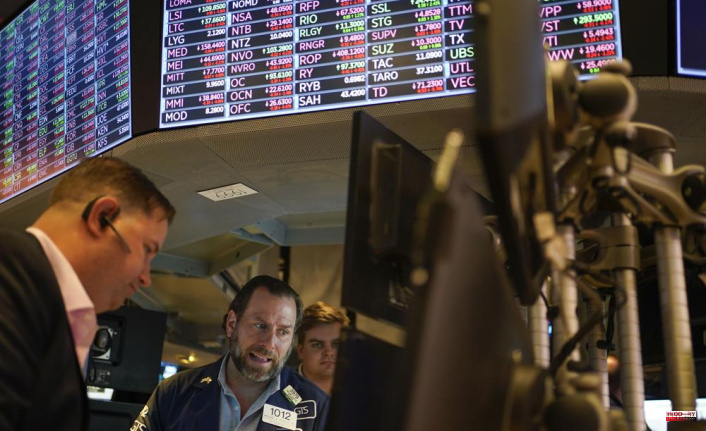Wall Street stocks lost more ground Tuesday due to mounting concerns that high inflation could cause a decline in corporate profits.
The S&P 500 lost 0.8% while the Nasdaq fell 2.3%. Due to large gains by McDonald's and UnitedHealth, the Dow Jones Industrial Average saw a 0.2% increase.
The broader market was weighed down by big technology and communications companies, although some selling did ease by the end of the afternoon.
Investors were scared by a stark profit warning issued by Snapchat's parent company and decided to dump stocks of major social media platforms. Snap plunged 43.1%, the largest single-day loss ever. Meta, Facebook's parent company, fell 7.6%. Google's parent dropped 5.1%.
With their high-valued stocks in technology and communications, they tend to have a large influence on the market. These sectors are responsible for much the market volatility recently and the wide decline in major indexes since April, as investors worry about the effect of rising inflation on consumers and businesses.
The market's slump this year has seen volatile trading, as evidenced by the pullback that scuttled a broad rally one day earlier.
"Just because there is so much uncertainty, people are still having trouble finding the one or two catalysts that give enough confidence to take risk assets on," stated Sameer Samana (senior global market strategist, Wells Fargo Investment Institute).
The S&P 500 lost 32.27 points, or 3,941.48, to 3,941.48. The Dow gained 48.38 Points to 31,928.62 and the Nasdaq lost 270.83 Points to 11,264.45
Stocks of smaller companies also dropped. The Russell 2000 fell 1.6% to 1,764.83, or 27.94 points.
Market concerns have pushed the benchmark S&P 500 towards a bear market. This is when the index drops 20% from its previous record high. It is now down 18% from the record high it reached earlier in the year.
A wide variety of industries have been affected by inflation, which has resulted in higher raw material costs and more expensive labor. To offset higher costs, many businesses have increased prices for everything, from food and clothing to compensate. But the pressure is increasing. Target and Walmart are two of the major retailers that have stated that rising costs are making it difficult to run their businesses. The retailers also expressed concern that consumers may be reducing their spending on a wide variety of goods.
Barry Bannister is chief equity strategist at Stifel. "When you think of consumer spending, wages can be great, but inflation can be greater," he said. "Consumers are being squeezed, and that's affecting every aspect of retail."
The supply-demand disconnect that Russia created in Ukraine led to another rise in energy prices, which already squeezed consumers. U.S. crude oil prices are up by about 50% this year, which has caused gasoline prices to reach record highs. This has resulted in consumers spending less because of the increased cost of fuel. China's recent lockdown of several major cities to deal with increasing COVID-19 cases has exacerbated supply chain problems.
"Just because there is so much uncertainty, people are still having trouble finding the one or two catalysts that give enough confidence to take risk assets on," stated Sameer Samana (senior global market strategist, Wells Fargo Investment Institute).
The S&P 500 lost 32.27 points, or 3,941.48, to 3,941.48. The Dow gained 48.38 Points to 31,928.62 and the Nasdaq lost 270.83 Points to 11,264.45
Stocks of smaller companies also dropped. The Russell 2000 fell 1.6% to 1,764.83, or 27.94 points.
Market concerns have pushed the benchmark S&P 500 towards a bear market. This is when the index drops 20% from its previous record high. It is now down 18% from the record high it reached earlier in the year.
A wide variety of industries have been affected by inflation, which has resulted in higher raw material costs and more expensive labor. To offset higher costs, many businesses have increased prices for everything, from food and clothing to compensate. But the pressure is increasing. Target and Walmart are two of the major retailers that have stated that rising costs are making it difficult to run their businesses. The retailers also expressed concern that consumers may be reducing their spending on a wide variety of goods.
Barry Bannister is chief equity strategist at Stifel. "When you think of consumer spending, wages can be great, but inflation can be greater," he said. "Consumers are being squeezed, and that's affecting every aspect of retail."
The supply-demand disconnect that Russia created in Ukraine led to another rise in energy prices, which already squeezed consumers. U.S. crude oil prices are up by about 50% this year, which has caused gasoline prices to reach record highs. This has resulted in consumers spending less because of the increased cost of fuel. China's recent lockdown of several major cities to deal with increasing COVID-19 cases has exacerbated supply chain problems.
ADVERTISEMENT
Wall Street is also concerned about the Federal Reserve's plans to combat inflation. Investors are also concerned about the Federal Reserve's plan to fight inflation. The central bank is increasing interest rates aggressively, but they could move too fast or go too far. This could cause businesses to slow down and possibly lead to a recession. Jerome Powell, Fed Chair, acknowledged that high inflation and economic weakness abroad could hinder the central bank’s efforts to cool down the economy and curb inflation. However, this would not lead to a recession.
Investors will be able to see the Fed's decision making process in detail on Wednesday when minutes from the most recent policy meeting are released.
Bannister stated that the market will not see any upside until oil cracks and the Fed stops.
Retailers and companies that depend on direct consumer spending were the biggest losers Tuesday. Target dropped 2.6% and Amazon fell 3.2%.
Bond yields fell. The 10-year Treasury yield fell to 2.76%, from 2.86% on Monday.
Banks, which depend on higher yields to charge lucrative interest on loans, were hit hard by falling bond yields. Wells Fargo fell 1.2%.
A government report that showed that new homes sales fell short of economists' expectations has caused a slump in homebuilders. KB Home fell 2.7%.







